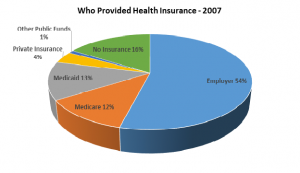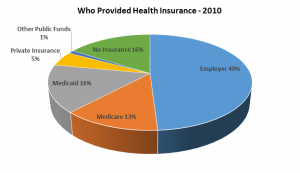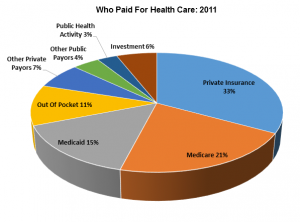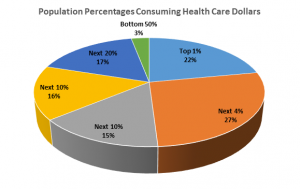Universal coverage in the United States goes back at least to Teddy Roosevelt but the opposition has always been fierce. The American Medical Association called the idea “socialized medicine.” Ronald Reag an said it was the first step towards Socialist America, warning “We are going to spend our sunset years telling our children and our children’s children, what it once was like in America when men were free.” We’d all be getting the same, substandard care from government-employed doctors in dreary Soviet-era clinics taking numbers and waiting months, if not years, for lifesaving care.
an said it was the first step towards Socialist America, warning “We are going to spend our sunset years telling our children and our children’s children, what it once was like in America when men were free.” We’d all be getting the same, substandard care from government-employed doctors in dreary Soviet-era clinics taking numbers and waiting months, if not years, for lifesaving care.
Prior to the 1930s workers bought “sickness insurance” to cover economic losses if the breadwinner fell ill. If you were sick, you stayed home or you went to the hospital to die. The Great Depression changed the doctors’ and hospitals’ attitudes; they struggled to survive because few could afford health care. The cost of medical care and training new physicians began to rise, as a result of advances in medicine and the Flexner report on medical education. By the 1930s, medical costs were 20% higher than lost wages, making health insurance, as oppose
In 1929 Baylor University Hospital provided Dallas schoolteachers up to 21 days of hospital care for fifty cents per person per month—the precursor to Blue Cross. Prepaid hospital plans grew throughout the Great Depression, allowing patients to cover expenses while insuring a steady income stream for hospitals. Hospitals agreed to provide benefits regardless of reimbursement levels.
Commercial insurers’ big break came during World War II. On October 3, 1942, Roosevelt issued the Stabilization  Act, freezing wages and prices, but not insurance and pension benefits. In 1943 the National War Labor Board and the Internal Revenue Service (IRS) exempted benefits from the freeze, allowing employers to entice desperately needed workers with health insurance. The post-war National Labor Relations Board (NLRB ruled pensions and health benefits could be included in collective bargaining in 1948, a ruling the Supreme Court upheld in 1949. In 1954, the IRS determined employer contributions to health employee health insurance plans were deductible as a business expense and not taxable income to employees. And so began our employer-based health insurance system which we assumed would last forever.
Act, freezing wages and prices, but not insurance and pension benefits. In 1943 the National War Labor Board and the Internal Revenue Service (IRS) exempted benefits from the freeze, allowing employers to entice desperately needed workers with health insurance. The post-war National Labor Relations Board (NLRB ruled pensions and health benefits could be included in collective bargaining in 1948, a ruling the Supreme Court upheld in 1949. In 1954, the IRS determined employer contributions to health employee health insurance plans were deductible as a business expense and not taxable income to employees. And so began our employer-based health insurance system which we assumed would last forever.
Blue Cross/Blue Shield’s federally-sanctioned non-profit status gave it an unfair advantage over commercial insurers by allowing the Blues to avoid insurance regulations. The government required the Blues to use “community rating” when calculating premiums; that is, everyone paid the same premium regardless of health status. Commercial insurers used “experience rating”, basing individuals’ premiums on their health history; sicker people paid more. Commercial insurers targeted employers of large groups of healthy people, undercutting Blue Cross in many markets.
The Blues reimbursed physicians’ “usual, customary and reasonable” (UCR) charges which effectively meant physicians could charge whatever they wanted. Hospitals received “cost-plus reimbursement”—whatever they charged and a little extra. Commercial insurers followed, lest it be left in the dust.
President Lyndon Johnson signed Medicare and Medicaid into law in 1965. Medicare was a federal health insurance program covering seniors’ health care expenses; Medicaid, a state program for the indigent. The Federal government became the single largest health care purchaser in the country. Physicians, initially resistant, fell in love with the programs, figuring they’d get paid for care they had previously rendered for free.
 And what’s not to love? Medicare adopted “cost-plus” reimbursement,”
And what’s not to love? Medicare adopted “cost-plus” reimbursement,”  paying doctors and hospitals what they charged. Patients didn’t worry because someone else was picking up the tab. Physicians routinely admitted patients to the hospital “so we can run a few tests.” As one retired hospital administrator explained, “Being an administrator was never easier! If a doctor wanted a new piece of equipment, we said, ‘yes,’ especially if a hospital across town had the same equipment. The more we did, the more we got paid. It was a great time to be in health care!”
paying doctors and hospitals what they charged. Patients didn’t worry because someone else was picking up the tab. Physicians routinely admitted patients to the hospital “so we can run a few tests.” As one retired hospital administrator explained, “Being an administrator was never easier! If a doctor wanted a new piece of equipment, we said, ‘yes,’ especially if a hospital across town had the same equipment. The more we did, the more we got paid. It was a great time to be in health care!”
So what happened? Stay tuned for the rest of the story.








